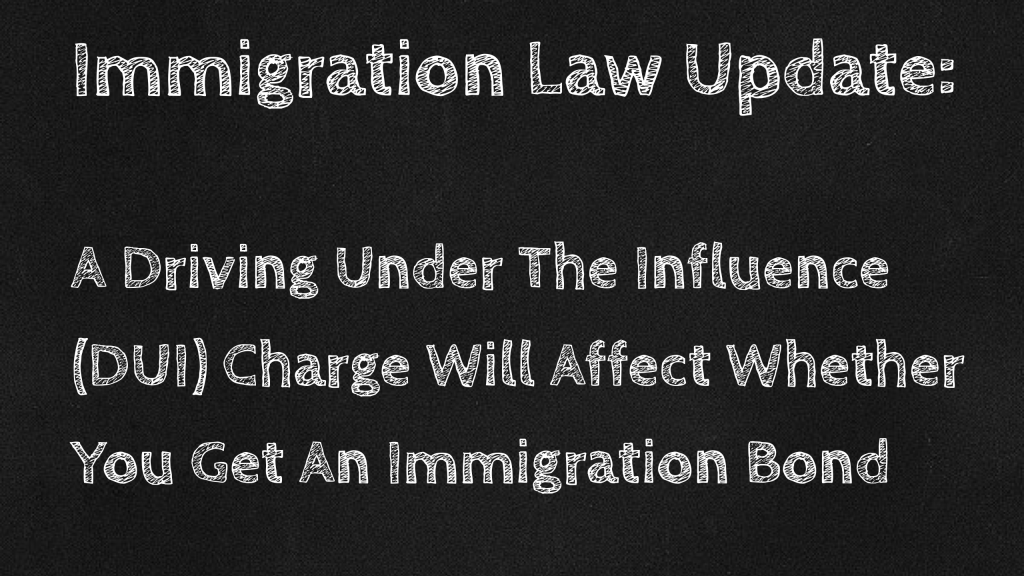
Immigration lawyers are talking about a new Board of Immigration Appeals (BIA) decision that is out. This case addresses how a DUI (Driving Under the Influence) arrest can result in not getting a bond in deportation proceedings. Whenever a person is placed in deportation/removal proceedings, the Immigration Judge will decide whether to issue a bond that will allow the person to get out of jail while the deportation case is going on. If you have certain criminal convictions, you may not be eligible for a bond. You must also establish that you are not a flight risk (risk to flee and not show up to court) and that you are not a danger to the community. If you have a criminal record, even a criminal arrest that has been dropped, it can be difficult to convince an Immigration Judge to give you a bond. The Board of Immigration Appeals has now made it even harder after overturning an Immigration Judge’s decision to give a bond to a person who had a DUI arrest and three prior DUI convictions ten years prior.
In Matter of Siniauskas, 27 I&N Dec. 207 (BIA 2018), the Board of Immigration Appeals overruled an Immigration Judge’s decision to give Mr. Siniauskas a $25,000 bond. Mr. Siniauskas had three prior DUI convictions, but they were more than ten years prior to his last DUI arrest. Mr. Siniauskas was in deportation proceedings because he overstayed his visa. However, he had several equities in his favor. He was married to a lawful permanent resident. He had a United States citizen child. He had maintained gainful employment and was a business owner. Because of these equities the judge gave Mr. Siniauskas a bond of $25,000. However, the Department of Homeland Security appealed and the Board of Immigration Appeals reversed.
The Board of Immigration Appeals stated that the alien, in this case, Mr. Siniauskas, must establish that he does not present a danger to persons or property, is not a threat to national security and is not a flight risk. The Board stated Mr. Siniauskas’ positive factors may have established that he is not a flight risk, but they did nothing to convince the Board that he was not a danger to persons and property. The Board stated that driving under the influence is a dangerous crime, and the immigration judge should consider the specific circumstances surrounding the alien’s conduct.
Even though the Immigration Judge gave Mr. Siniauskas a significant monetary bond of $25,000, the Board stated that an Immigration Judge should only set a monetary bond when the respondent establishes that he or she is not a danger to the community. Here, the Board held, that Mr. Siniauskas did not establish that he is not a danger to the community and therefore the Immigration Judge must keep him detained, and cannot give Mr. Siniauskas any monetary bond.
It remains to be seen how this case will be used by the government to seek detention on non-citizens who are charged with a first time DUI. Immigration Judges have denied bond based on nothing but a one time arrest for DUI where there has been no criminal conviction. Even when the charges have been dropped, Immigration Judges have used the circumstances listed in the police report to deny bond.
If you, or a loved one, are charged with a DUI and are not a United States citizen, it is important to contact an immigration lawyer right away to discuss the options for an immigration bond. Whether the Immigration Judge gives a bond often is determined by which Immigration Judge hears the case. Some Immigration Judges are tougher on bond hearings than others. Some are tougher on DUI arrests than others. It is important to talk to an experienced immigration lawyer who knows the judges’ tendencies, so you can be better informed on what may happen in your case.
 Jeremy Lasnetski is a partner at the Law Offices of Lasnetski Gihon Law. The firm focuses on criminal defense, immigration and personal injury. Mr. Lasnetski focuses his practice on immigration and criminal defense. Mr. Lasnetski is the former Jacksonville Regional Vice Chair of the American Immigration Lawyer’s Association, Central Florida Chapter and has represented clients in deportation proceedings, USCIS benefit cases, consular processing cases, and more. He routinely gives presentations on immigration law issues to both criminal and immigration lawyers at conferences and seminars throughout the State of Florida.
Jeremy Lasnetski is a partner at the Law Offices of Lasnetski Gihon Law. The firm focuses on criminal defense, immigration and personal injury. Mr. Lasnetski focuses his practice on immigration and criminal defense. Mr. Lasnetski is the former Jacksonville Regional Vice Chair of the American Immigration Lawyer’s Association, Central Florida Chapter and has represented clients in deportation proceedings, USCIS benefit cases, consular processing cases, and more. He routinely gives presentations on immigration law issues to both criminal and immigration lawyers at conferences and seminars throughout the State of Florida.
 Florida Immigration Lawyer Blog
Florida Immigration Lawyer Blog

